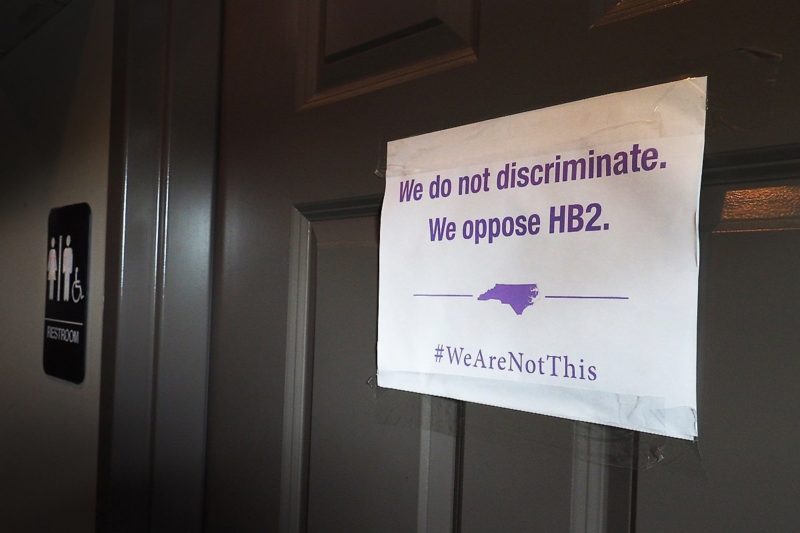‘North Carolina Is Becoming a Verb’ as GOP Stands by Anti-LGBTQ Law
"We are seeing states all over the country with bills like HB 2 being proposed, but the leadership in these states are saying over and over again, 'Let’s not North Carolina ourselves,'" said Mara Keisling, executive director of the National Center for Transgender Equality.

North Carolina lawmakers must vote for a “clean and full repeal” of the state’s anti-LGBTQ law, or they risk further unsustainable damage to the state’s economy, LGBTQ rights advocates said.
Representatives from Equality North Carolina, the Human Rights Campaign, and the National Center for Transgender Equality issued the warning Wednesday in a press call.
Sports officials have warned North Carolina’s political leaders that the state could soon lose the privilege of hosting NCAA games for the next six years if HB 2, the so-called bathroom bill, is not repealed soon.
North Carolina Republicans last March passed HB 2 in a a special one-day session in response to a Charlotte ordinance that would have extended anti-discrimination protections to LGBTQ people and allowed transgender people to use restrooms that match their gender identity.
HB 2 keeps local jurisdictions from passing ordinances similar to Charlotte’s and forces transgender people to use bathrooms based on the gender listed on their birth certificates. When Republicans passed the law last year, businesses, entertainers, and athletic groups (including Deutsche Bank and Bruce Springsteen) boycotted the state.
Mara Keisling, executive director of the National Center for Transgender Equality, said North Carolina was “becoming a verb.”
That verb, she said, means “acting like an immature, obdurate legislature and doing dumb things that that don’t help anybody and only hurt the state.”
“We are seeing states all over the country with bills like HB 2 being proposed, but the leadership in these states are saying over and over again, ‘Let’s not North Carolina ourselves,'” Keisling said on Wednesday’s press call.
Gov. Roy Cooper (D), who in 2016 won a tight race against Republican incumbent Pat McCrory, said in February that enough votes existed to repeal HB 2 if Republican legislative leaders would allow a floor vote, the News & Observer reported. Democratic lawmakers introduced new bills to repeal HB 2, including a measure authored by Rep. Cecil Brockman (D-Guilford).
Cooper in December criticized the GOP-majority general assembly after lawmakers broke their promise to repeal HB 2. Many North Carolina Democrats opposed SB 4, a compromise bill the GOP introduced that would have repealed HB 2 while preventing municipalities from passing laws like the Charlotte anti-discrimination ordinance.
Chris Sgro, executive director of Equality North Carolina, said he was “frustrated and saddened” that people who need a job can’t find one because the state is losing business and suffering from a tarnished reputation.
Sgro, a Greensboro resident, said the city’s Coliseum Complex, home to the University of North Carolina at Greensboro’s men’s basketball team and the Atlantic Coast Conference (ACC), will continue to suffer if HB 2 is not repealed.
Greensboro Mayor Nancy Vaughan has said the city is set to lose more than 50 bids on NCAA and ACC tournament games if HB 2 remains a law, Sgro said.
“And that doesn’t simply mean we don’t get to watch college basketball in our city, it also means hundreds working security, janitorial services, and concessions won’t have a paycheck for that evening,” Sgro said.
Rep. Pricey Harrison (D-Guilford) told the Charlotte Observer last month that cancelled sporting events have already cost Greensboro $24 million, and another $120 million is on the line. Politifact.com, the nonpartisan fact-checking website, found that the anti-LGBTQ measure cost North Carolina an estimated $450-to-630 million and at least 1,400 jobs.
Sgro noted that HB 186, another compromise bill authored by GOP lawmakers, had been falsely described as a repeal even though it was really “HB 2.0.” “It was an effort to keep discrimination but call it by another name. And now, we’re almost out of time,” he said.
Sgro said that under the leadership of Senator Phil Berger (R-Rockingham) and house Speaker Tim Moore (R-Cleveland), the legislature has recently considered a host of trivial measures such as HB 74, which would adopt the bobcat as state cat.
Chad Griffin, president of Human Rights Campaign, said Moore and Berger have inflicted irreparable harm “on the very people they were elected to serve.”
Fifty-seven percent of citizens who opposed McCrory’s bid for reelection cited HB 2 as the number one reason they didn’t vote for him, according to the Human Rights Campaign.
North Carolina Lt. Gov. Dan Forest (R) downplayed the economic impact of HB 2 at a Monday press conference in Texas, where he spoke in support of SB 6, Texas’ version of the discriminatory bill.
When asked about Forest’s comments, Sgro told Rewire the politician was spreading “hate, potentially destructive legislation, and misinformation.”
A coalition of sexual assault and domestic violence prevention organizations noted last year that none of the municipalities and states with nondiscrimination laws have seen a spike in sexual violence or other public safety issues, ABC News reported.
